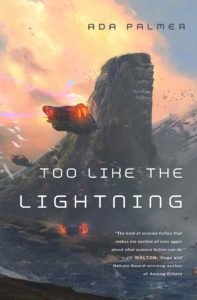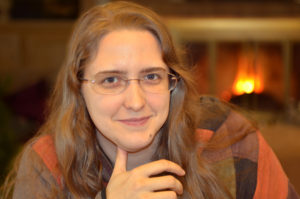Today I am hosting an interview with Ada Palmer, the latest stop on her blog tour for her new book Too Like the Lightning. I’ve attempted to avoid spoilers in both interview questions and review, although both refer to the contents; you can read my thoughts on the book here.
1) Are you in some sense a dual-vocateur, or is only one of writing and history your vocation? or are they the same vocation? or is something else “how you introduce yourself at parties” (cooking, singing, art appreciation)?
I introduce myself as both. I’ve been delighted to have a lot of readers respond enthusiastically to voker/vocateur, and I do think it’s something we see every day but don’t have a good name for, the difference between someone who works and then stops versus someone for whom work is an all-hours passion. We have “day job” but that implies that it’s somehow not important, not the real you, whereas I have friends who love their jobs and are great at them but are still happy that the job ends when they clock out. I like how voker/vocateur make clear that both kinds of relationship to one’s work are good and worthy of respect. For myself, history and writing are very much intertwined sets of one vocation, born mostly out of reading figures from the past. I talk in my author’s note at the end about what I call the Great Conversation, how authors in past eras responded to each other. It’s a conversation across time, years and decades of human labor poured into writing works for later generations to receive, in the pure faith that there will be yet more scholars in the future to read, and to respond. They worked so hard to pass things forward, copying them by hand as centuries made the papyrus crumble, and commenting and responding, continuing the conversation life by life. Petrarch did it most overtly. He wrote letters to Seneca and Cicero in response to reading their letters even though they had been dead a thousand years. And he also wrote a letter to Posterity, just the same way, addressed to the later scholars for whom he salvaged Cicero and Seneca, expecting us to pass it forward too. I want to read that, to discuss it, study it, share it with others, that’s the heart my scholarship, what I do as a historian and as a history professor. But I also want to do more. Petrarch didn’t want us to just measure and discuss him and his peers like so many specimens in a cabinet. He wanted us to reply. I don’t know how anyone can read Petrarch’s letters to us, and Voltaire’s, and Cicero’s, and not want to reply. To pass it forward. To pay it forward, all those years they gave us, trusting us, to give some years back, to them and to Posterity. So I replied. That’s the fiction. And, like them, I trust there will be more replies to come.
2) You spend much of your time teaching people who are “blessed with newness,” though less blessed than Bridger. How do you think your experience as a professor has changed how you write sensayers, caregivers, and others who interact with the young?
Interesting question. I think that transitioning from being taught to teaching has made me think a lot about what it was like being the student, doing a lot of analysis of points when I had good experiences with teachers, or bad ones, and trying to think from the other end what the big differences are. I think a lot of it has to do with whether the person in the teacher position thinks of the students as peers/people equivalent to the teacher, or whether the teacher categorizes students as other/separate. My worst student experiences tended to be situations where the teacher wouldn’t talk to us about why we were learning, what the bigger purpose was, and didn’t want to follow up probing questions. Situations where we were clearly units to be given information/instruction like so many potted plans to be given water. The best experiences were ones where teachers were eager to discuss the deeper purposes behind what we were learning, would step up at the outset to explain the why and what for, and the origins of things. I felt that a lot of the difference came from empathy, whether teachers thought of students as coequal human beings with a natural right to understand why, and to ask questions, like anyone in a normal conversation. When I write caregiver or teacher characters I think a lot about whether the caregiver/teacher thinks of interlocutors/students as equals, or as subjects to be protected/educated/guided by someone who knows better. Carlyle very much empathizes and everyone else as coequal participants in exploring something Carlyle just happens to have explored more than most. Other caregivers that we see have that to a lesser degree, or no degree. Set-sets bring out this tension a lot, since their seeming inhumanity makes it extra easy for people to see them as other/not self. The tension between good and bad teachers/caregivers, and the consequence of that difference for the world, will continue to grow over the four books.
3) Bash’es [deliberately formed quasi-family-type living groups] are of primary importance in this book, in this culture, but all the bash’es we see in serious detail are comparatively stable–that is, already formed. How tempted were you to do a side plot in bash’ formation? Can we hope for one in future books?
Yes, in fact I’m working at this very moment on a chapter which treats that quite a bit. The first part of this story focuses on the mature stages of large political plans and manipulations, and on the consequences of hereditary bash’es as opposed to new-formed bash’es. So it didn’t make sense for a young college-age new bash’ to be central to that action. I was also interested in focusing primarily on more mature characters, since there is already so much great genre fiction about young adults and coming-of-age, so it felt to me like I had more new things to contribute to a world of adults. But in the later books, as we see the consequences of these “days of transformation” Mycroft is describing, then there will be some attention to new bash’es, and in particular to how challenging and frightening it is to be in the midst of trying to form a new bash’ when all this occurs.
4) The Hives carefully all have strengths and appeal and weaknesses/downsides. Do you try to guess which Hive your friends would choose? Do you mostly guess right? Or do they let you pick for them?
The question is usually “What Hive would you be if you weren’t a Utopian?” Most of my friends are just as deep into science fiction & fantasy as I am, so Utopia is almost everyone’s first choice. But it’s fun asking people which other Hive they would pick. Sometimes people have an instant answer that feels exactly right, and you think “Yes, of course he’d be a Brillist,” but sometimes people are torn and we have a great discussion, and talk about the merits and appeals of each. It’s often especially interesting for noticing differences between friends, for example conversations where one friend finds the European and Mitsubishi Hives appealing because ancestry and nation of origin are important to that friend, and ethnicity/nationalism are important parts of those two Hives, but another friend in the same conversation may be baffled and find those two Hives totally unappealing. In the course of the conversation we discover how unimportant ancestry/nation is to that friend in contrast with the other. I think that many fictional stories sort people into groups by personality, or by the kinds of jobs people want to do, but fewer do it by political philosophy as Hives do, since they relate to fundamental ideas of how justice should work, or what the source of power is. I’ve never thought of trying to guess or assign Hives to others, though, I think of it as such a personal thing, it would be an invasion of privacy to impose it on someone. Some of my friends want to make an online quiz, which I think could be a lot of fun. And I’ve found it interesting that, while almost all my friends say “Utopia first!” I’ve had several friends be deeply torn between Utopia and Cousins, and feel they would have to reluctantly pick Cousins over Utopians. I think that the Cousins pull very differently from most of the Hives, based more on personality than philosophy in some senses, and it’s interesting to see the Cousins be the one that makes even SF fans torn. I look forward to seeing how those who identify with Cousins will respond to the later books, especially the fourth.
5) The Terra Ignota series is substantial–several volumes coming from Tor. Do you have plans to do any shorter work, either in other universes or in other times/places in this universe? Or is Terra Ignota taking up all your fictional time and energy for the moment?
I find short fiction extremely challenging, it’s never flowed well for me, even though I love reading short fiction, especially short mysteries and ghost stories. I read a lot more short fiction than novels, but writing is very difficult (for which reason I’m a huge admirer of how you pour out so much incredible short fiction! [hey, thanks!–ed.]) I have one standalone short story that I’ve been trying to finish for… an embarrassing number of years, and do hope to finish someday. I have one idea for a short story in the world of Terra Ignota, and I have the scene all picked out, but the structure of how to make it stand alone has never come. So it’s just the novels for now, unless I ever finally conquer that short story. But Terra Ignota isn’t taking up all my fictional energy right now, a lot of my energy is going into planning for the next couple of novel series I intend to start writing when Terra Ignota is finished. I spent five years world building Terra Ignota before I sat down to outline and then write it, so I have several other series that are in that long preparatory stage, including two complete worlds that are just about ready to be outlined and written, and a couple other worlds that need a few more years of work to fill in all the gaps.
Ada Palmer is a professor in the history department of the University of Chicago, specializing in Renaissance history and the history of ideas. Her first nonfiction book, Reading Lucretius in the Renaissance, was published in 2014 by Harvard University Press. She is also a composer of folk and Renaissance-tinged a capella music, most of which she performs with the group Sassafrass. Her personal site is at adapalmer.com, and she writes about history for a popular audience at exurbe.com and about SF and fantasy-related matters at Tor.com.



